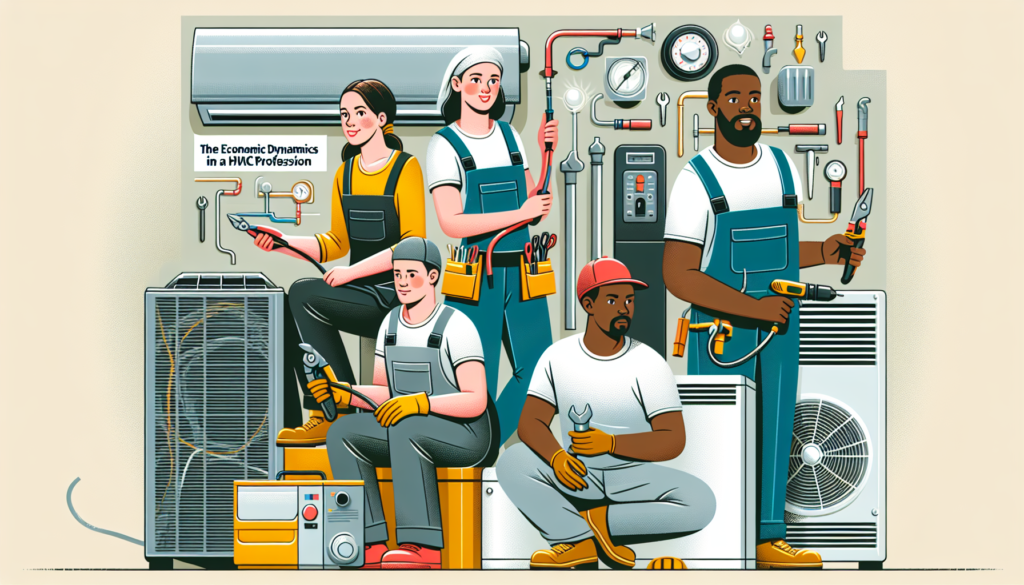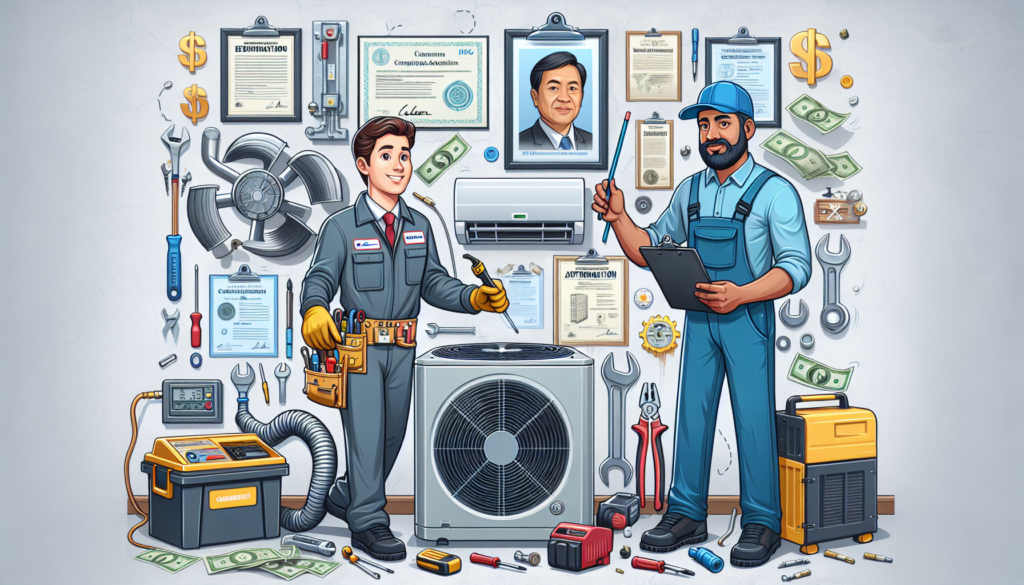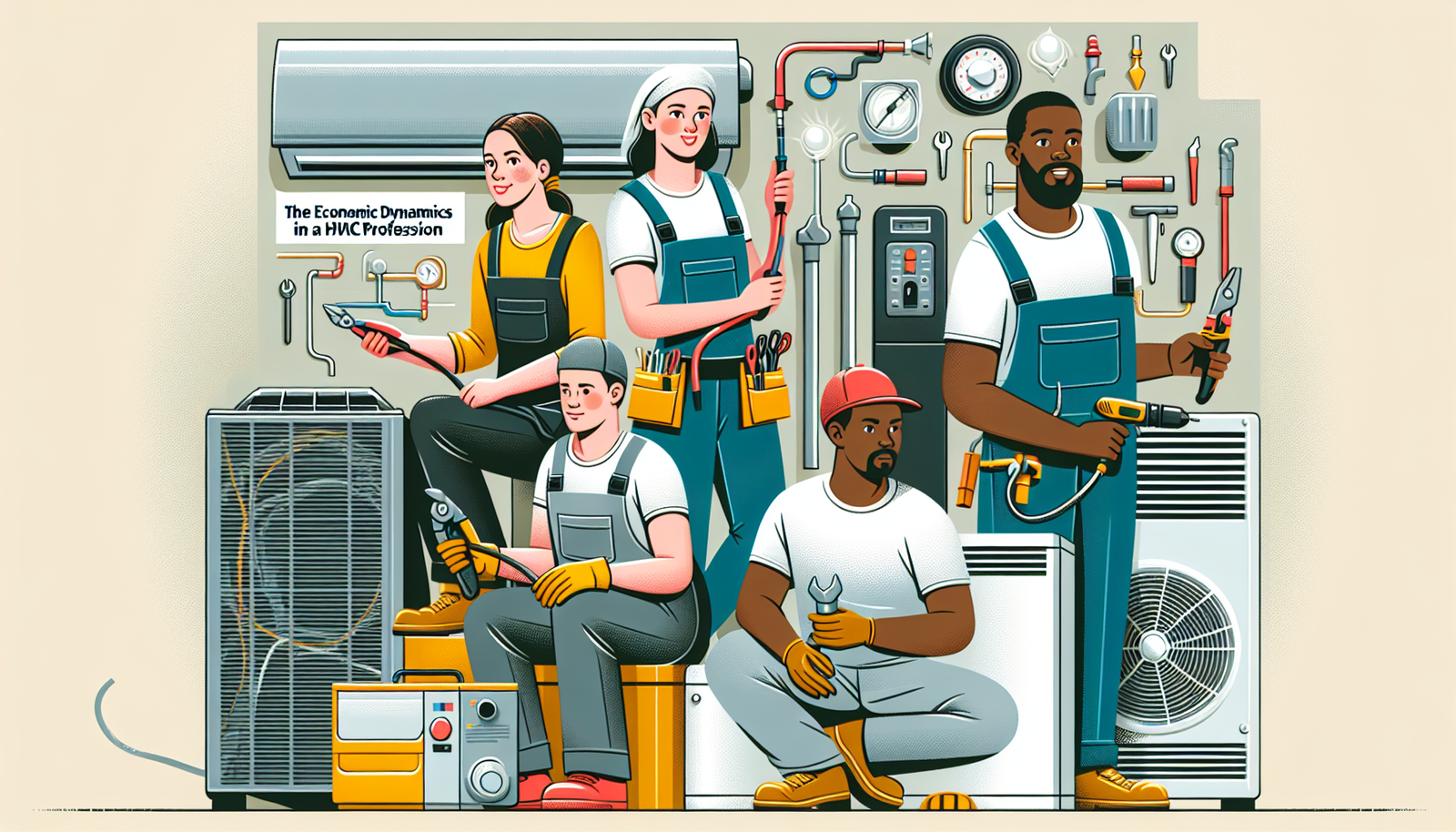If you’ve been considering a career as an HVAC technician, you may be curious about the earning potential in this field. Well, the good news is that HVAC technicians can enjoy a satisfying income that reflects their skill and expertise. Whether you’re starting out or have years of experience under your belt, the salary of an HVAC technician can be quite attractive, providing a stable and rewarding career path. Let’s take a closer look at the factors that influence HVAC technician salaries and the potential earnings you can expect in this industry.
Average HVAC Technician Salary
If you’re considering a career as an HVAC technician, you may be wondering about the salary you can expect to earn. While there is no one-size-fits-all answer, as there are several factors that can affect your salary, it’s important to have a general understanding of the average salaries in the field. This article will explore the average HVAC technician salary, the factors that can influence your earning potential, and ways to increase your salary.
Factors Affecting Salary
Several factors can impact an HVAC technician’s salary. Understanding these factors is crucial in evaluating your earning potential and making informed career decisions.
Experience Level
Experience plays a significant role in determining an HVAC technician’s salary. As a general rule, technicians with more experience tend to earn higher salaries. Entry-level technicians, who are just starting their careers, typically earn less than mid-level technicians with a few years of experience. Similarly, experienced technicians who have been in the field for many years can command higher salaries due to their extensive knowledge and skills.
Education and Certifications
Education and certifications can also impact an HVAC technician’s salary. While a high school diploma or equivalent is the minimum educational requirement for most HVAC positions, pursuing additional education and certifications can enhance your earning potential. Technicians who have completed vocational training programs or obtained relevant certifications often earn higher salaries compared to those without such qualifications. These additional credentials demonstrate a higher level of expertise and can make you more marketable to employers.
Location
Geographic location plays a significant role in determining an HVAC technician’s salary. Salaries can vary widely between different regions and cities. For example, HVAC technicians working in high-cost-of-living areas or major metropolitan cities may earn higher salaries due to increased demand and higher living expenses. On the other hand, technicians in rural areas or regions with a lower cost of living might earn relatively lower salaries. It’s essential to take into account the local market dynamics and cost of living when evaluating salary prospects in a specific location.
Type of Employment
The type of employment can also impact an HVAC technician’s salary. Residential, commercial, and industrial HVAC technicians may have different earning potentials depending on the nature of their work. Residential HVAC technicians focus on installing and maintaining heating and cooling systems in private homes, while commercial HVAC technicians work on larger-scale systems in commercial buildings. Industrial HVAC technicians deal with complex systems in industrial settings. The salary potential may vary depending on the level of expertise and the types of systems handled in each employment sector.

Experience Level
As mentioned earlier, experience level is a crucial factor in determining an HVAC technician’s salary. Let’s take a closer look at the different experience levels and how they correspond to earning potential.
Entry-Level Technicians
Entry-level HVAC technicians are generally those who have just completed their education or training and are starting their careers. As beginners in the field, they typically earn lower salaries compared to their more experienced counterparts. However, entry-level positions can provide valuable hands-on experience and serve as a stepping stone to higher-paying roles in the future.
Mid-Level Technicians
Mid-level HVAC technicians have gained some experience and may have a few years of work under their belts. With this increased experience, they are likely to earn higher salaries compared to entry-level technicians. Mid-level technicians have developed a solid foundation of knowledge and skills and can handle a wider range of tasks independently.
Experienced Technicians
Experienced HVAC technicians who have been in the field for many years are often considered experts in their craft. With their extensive knowledge and skills, they can command higher salaries compared to both entry-level and mid-level technicians. Experienced technicians are sought after for their ability to troubleshoot complex issues and provide efficient solutions, making them valuable assets to employers.
Education and Certifications
While a high school diploma or equivalent is the minimum requirement for most HVAC technician positions, further education and certifications can enhance your earning potential. Let’s explore the different education and certification options available.
High School Diploma or Equivalent
A high school diploma or equivalent is typically the baseline requirement for entering the HVAC field. This educational qualification provides the foundational knowledge necessary to start a career as a technician. However, it’s important to note that earning potential may be limited without further education or certifications.
Vocational Training
Completing a vocational training program in HVAC can significantly boost your earning potential. These programs offer specialized instruction in heating, ventilation, air conditioning, and refrigeration, equipping you with the practical skills needed for the job. Many vocational training programs also provide hands-on experience through internships or apprenticeships, allowing you to gain valuable real-world experience before entering the workforce.
Certifications
Obtaining industry-recognized certifications can demonstrate your expertise and make you more competitive in the job market. Certifications such as the North American Technician Excellence (NATE) certification or the HVAC Excellence certification validate your knowledge and skills in specific areas of HVAC. These certifications can open doors to higher-paying job opportunities and increase your earning potential.

Location
Geographic location is an essential factor to consider when evaluating salary prospects as an HVAC technician. Let’s explore how location can impact earning potential.
Regional Differences
Salaries for HVAC technicians can vary significantly between different regions. In some areas, such as major cities or regions with a strong demand for HVAC services, higher salaries may be offered to attract and retain skilled technicians. Conversely, rural areas or regions with less demand for HVAC services may have lower salary ranges. It’s important to research and consider the local market conditions when evaluating salary expectations in a specific region.
Urban vs. Rural Areas
The distinction between urban and rural areas can also affect HVAC technician salaries. Urban areas, especially major cities, often have a higher cost of living and increased demand for HVAC services due to a larger population and numerous commercial and residential buildings. As a result, HVAC technicians working in urban areas may have higher salary ranges compared to those in rural areas with lower living costs and fewer potential clients.
Cost of Living
The cost of living in a particular location can directly impact an HVAC technician’s salary. Higher living expenses, such as housing, transportation, and healthcare, can necessitate higher salaries to maintain a comfortable standard of living. It’s important to research and consider the cost of living in your desired location when evaluating salary prospects to ensure your income meets your needs.
Type of Employment
The type of employment can also influence an HVAC technician’s salary. Let’s explore the different types of HVAC employment and how they correspond to salary ranges.
Residential HVAC Technicians
Residential HVAC technicians focus on installing, maintaining, and repairing heating and cooling systems in private homes. As residential projects typically involve smaller-scale systems, the salary range for residential HVAC technicians may be more limited compared to commercial or industrial technicians. However, residential technicians often enjoy regular working hours and a stable workload, which can be appealing to some individuals.
Commercial HVAC Technicians
Commercial HVAC technicians work on larger-scale systems found in commercial buildings such as offices, retail spaces, and restaurants. Commercial projects may require more specialized knowledge and skills due to the complexity of the systems involved. As a result, commercial HVAC technicians often command higher salaries compared to residential technicians. Additionally, commercial projects may offer more opportunities for overtime or higher-paying contracts.
Industrial HVAC Technicians
Industrial HVAC technicians work in industrial settings such as manufacturing plants or large facilities. These technicians often deal with highly complex systems and must possess advanced troubleshooting skills. Due to the specialized nature of their work, industrial HVAC technicians may earn higher salaries compared to residential and commercial technicians. However, the demands of industrial projects may include irregular working hours or being on call for emergencies.
Median Annual Salary
Now, let’s explore the median annual salary for HVAC technicians as well as how it varies based on experience level, location, and type of employment.
National Average
The national average salary for HVAC technicians in the United States is approximately $50,590 per year. This figure provides a benchmark for evaluating salaries across different regions and industries. However, it’s important to note that the national average does not account for variations in living costs between different regions.
Salaries by Experience Level
As mentioned earlier, experience level greatly influences an HVAC technician’s salary. Based on national averages, entry-level technicians can expect to earn around $35,000 to $40,000 per year. Mid-level technicians, with a few years of experience, can earn between $40,000 and $50,000 per year. Meanwhile, experienced technicians may earn upwards of $50,000 per year, with some earning salaries exceeding $70,000 based on their expertise and demand for their skills.
Salaries by Location
Salaries can vary significantly depending on the location in which an HVAC technician works. For example, technicians in high-cost-of-living areas such as New York City or San Francisco may earn higher salaries to compensate for the increased expenses. On the other hand, technicians in rural areas or regions with a lower cost of living may earn lower salaries due to lower living expenses. It’s essential to research the geographic location you plan to work in to determine the corresponding salary range.
Salaries by Employment Type
The type of employment can also impact an HVAC technician’s salary. Based on national averages, residential HVAC technicians may earn between $35,000 and $50,000 per year. Commercial HVAC technicians can expect to earn between $45,000 and $60,000 per year, while industrial HVAC technicians may earn between $50,000 and $70,000 per year. These ranges can vary depending on factors such as experience level, location, and the complexity of the systems handled in each sector.
Salary Range
In addition to the median annual salary, it’s important to consider the salary range for HVAC technicians. This range can provide a better understanding of the potential salary fluctuations within the field.
Entry-Level Range
Entry-level HVAC technicians can expect to earn salaries within a range of approximately $30,000 to $45,000 per year. The specific salary within this range can vary depending on factors such as education, certifications, location, and the employing company.
Mid-Level Range
Mid-level HVAC technicians with a few years of experience can expect salaries falling between $40,000 and $60,000 per year. This range reflects the additional skills and expertise gained through experience, as well as other factors such as location and the type of employment.
Experienced Range
Experienced HVAC technicians, who have been in the field for many years and possess advanced knowledge and skills, can earn salaries exceeding $70,000 per year. Some highly experienced technicians may even earn six-figure salaries based on their expertise, demand in the market, and additional factors such as certifications or specializations.
Average HVAC Technician Salary in Different Industries
While the majority of HVAC technicians work in the construction industry, there are various other industries where these professionals can find employment. Let’s explore the average salaries for HVAC technicians in different industries.
Heating and Air Conditioning Contractors
The majority of HVAC technicians work for heating and air conditioning contractors. In this industry, technicians can expect to earn salaries within the national average range of approximately ,000 per year. However, salaries can vary depending on factors such as location, experience level, and the size and reputation of the contracting company.
Building Equipment Contractors
HVAC technicians employed by building equipment contractors, who focus on installing and maintaining various systems within buildings, can expect to earn salaries similar to those in the heating and air conditioning contractors’ industry. Salaries for these technicians often fall within the national average range of approximately $50,000 per year.
Elementary and Secondary Schools
HVAC technicians employed by elementary and secondary schools typically earn salaries within the national average range. However, there may be variations depending on geographic location and the scale of the educational institution. Salaries can range from around $40,000 to $60,000 per year.
Local Government
HVAC technicians employed by local government entities, such as school districts or municipalities, often enjoy stable salaries with benefits such as healthcare and retirement plans. Salaries for technicians in local government positions typically fall within the national average range and can vary depending on factors such as location and the scale of the government entity.
Ways to Increase Salary Potential
While understanding the average HVAC technician salary is important, it’s equally essential to explore ways to increase your earning potential. Here are several strategies to consider.
Continuing Education and Certifications
Continuing education and obtaining additional certifications can enhance your skills and increase your earning potential. By staying updated with the latest industry trends, technologies, and best practices, you can position yourself as a valuable asset to employers and potentially qualify for higher-paying positions.
Specialty Areas
Specializing in specific areas of HVAC can lead to increased salary potential. As technology evolves and the industry becomes more specialized, technicians who have expertise in areas such as energy efficiency, sustainability, or advanced control systems may be in higher demand. This demand for specialized skills can result in higher salaries and more opportunities for career advancement.
Union Membership
Joining an HVAC technician union can provide several benefits, including increased job security, access to training programs, and the potential for higher wages. Unions negotiate on behalf of their members to ensure fair wages and working conditions. By becoming a union member, you can potentially increase your salary and receive additional benefits and protections.
Job Performance
Consistently demonstrating excellent job performance can lead to salary increases and promotions. By exceeding expectations, consistently delivering high-quality work, and demonstrating a strong work ethic, you can position yourself as an invaluable asset to your employer. Employers often reward exceptional performance with salary increases and other forms of recognition.
In conclusion, the average HVAC technician salary can vary depending on factors such as experience level, education, location, and employment type. By understanding these factors, you can evaluate your earning potential and make informed decisions about your career. Additionally, pursuing further education, obtaining certifications, specializing in specific areas, joining a union, and consistently demonstrating excellent job performance can help increase your salary potential. As you embark on your HVAC technician career, remember that your salary can grow as you gain experience, expand your knowledge, and become an invaluable asset to employers in the industry.

